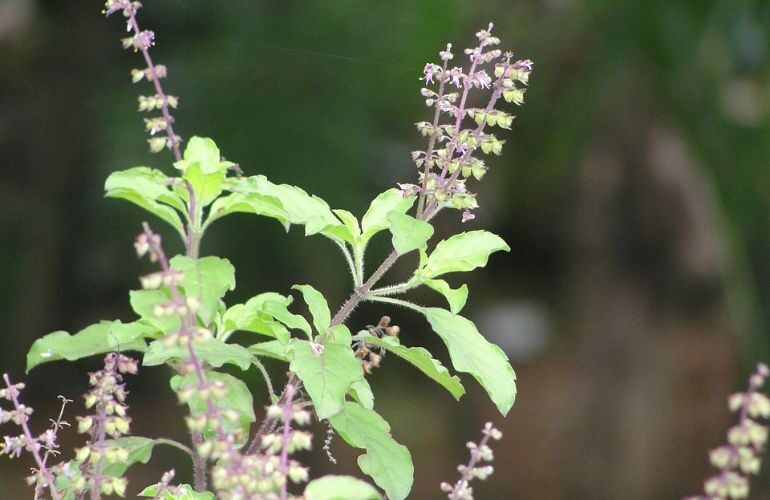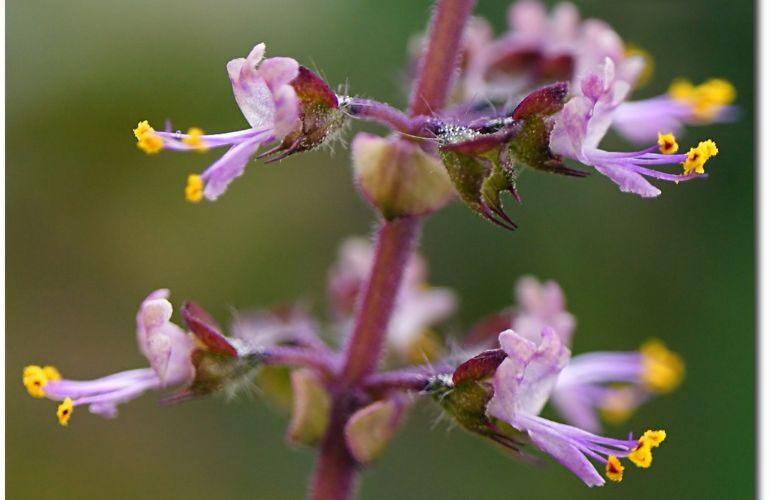Identification
Holy basil, also known as Tulsi, is a sacred plant in Hinduism and is often grown in households and temples. Here are some ways to identify a Holy basil plant:
- Look for its distinctive leaves: Holy basil leaves are broad, slightly hairy, and have a strong fragrance. The leaves are usually green, but some varieties may have a purple or reddish tint.
- Check the stem: The stem of a Holy basil plant is usually green or reddish-brown in color and has a slightly furry texture.
- Smell the leaves: Holy basil has a strong, sweet, and spicy aroma that is very distinct from other types of basil.
- Look for flowers: Holy basil produces small, white or pinkish flowers in tight clusters at the top of the plant.
- Check the plant size: Holy basil can grow up to 2 feet tall and wide, depending on the variety.
All parts of the Holy basil plant, including the leaves, stem, seeds, and flowers, are used for medicinal purposes. Here are some of the most common uses:
- Leaves: The leaves of Holy basil are the most commonly used part of the plant for medicinal purposes. They are used to make tea, extracts, and capsules. Holy basil leaves are believed to have anti-inflammatory, anti-bacterial, anti-fungal, and anti-viral properties. They are used to treat a variety of health conditions, including respiratory infections, fever, asthma, arthritis, diabetes, and digestive problems.
- Seeds: The seeds of Holy basil are used to make oil, which is used topically for skin conditions such as acne, eczema, and psoriasis.
- Stem: The stem of Holy basil contains essential oils that are used in aromatherapy to promote relaxation and reduce stress.
- Flowers: The flowers of Holy basil are used to make tea, which is believed to have a calming effect on the mind and body.
Common Name
Holy Basil
Scientific Name
Ocimum tenuiflorum
Name in popular languages
- French: Basilic sacré or Tulsi
- Spanish: Albahaca santa or Tulsi
- German: Indisches Basilikum or Tulsi
- Italian: Basilico sacro or Tulsi
- Portuguese: Manjericão sagrado or Tulsi
- Russian: Священный базилик (Svyashchennyy bazilik) or Тулси (Tulsi)
- Chinese: 圣罗勒 (Shèng luólè) or 草乌 (Cǎo wū)
- Japanese: ホーリーバジル (Hōrī bajiru) or オキナワシソ (Okinawa shiso)
- Korean: 홀리 바실 (Hollī basil) or 나무반죽 (Namubanjuk)
- Arabic: ريحان مقدس (Rayhan muqaddas) or تولسي (Tulsi)
- Hindi: तुलसी (Tulsi)
- Bengali: তুলসী (Tulsi) or তুলসী পাতা (Tulsi Pata)
- Gujarati: તુલસી (Tulsi)
- Marathi: तुळशी (Tulsi)
- Punjabi: ਤੁਲਸੀ (Tulsi) or ਤੁਲਸੀਆਂ ਦੇ ਪੱਤੇ (Tulsiyan De Patte)
- Tamil: துளசி (Thulasi)
- Telugu: తులసి (Tulasi)
- Kannada: ತುಳಸಿ (Tulasi)
- Malayalam: തുളസി (Thulasi)
Origin and History
Holy basil, also known as Tulsi, is native to the Indian subcontinent and Southeast Asia. It has been cultivated for thousands of years and is considered a sacred plant in Hinduism. The plant has been used for medicinal purposes in Ayurvedic medicine, an ancient system of healing that originated in India, for over 3,000 years. In Ayurvedic medicine, Holy basil is believed to have a wide range of health benefits, and it is used to treat a variety of ailments.
The history of Holy basil’s use for medicinal purposes dates back to ancient times. The plant was mentioned in the Charaka Samhita, an Ayurvedic medical text written in Sanskrit, as a herb that promotes longevity and enhances the body’s natural defenses. Holy basil was also used in ancient Greek and Roman medicine for its medicinal properties, and it was believed to have a purifying effect on the body.
Throughout history, Holy basil has been used to treat a variety of health conditions, including respiratory infections, fever, asthma, arthritis, diabetes, and digestive problems. It is also believed to have anti-inflammatory, anti-bacterial, anti-fungal, and anti-viral properties.
Today, Holy basil is widely used in traditional medicine systems across India and Southeast Asia, and its popularity is spreading globally as more people discover its health benefits. It is used in various forms, including teas, extracts, capsules, and essential oils, and it continues to be an important part of traditional medicine and cultural practices.
Nutritional constituents
Holy basil, also known as Tulsi, is a herb that has been used in traditional medicine for centuries. It is believed to have various health benefits and is rich in nutrients. Here are some of the key nutritional constituents of Holy basil:
- Essential oils: Holy basil contains essential oils, including eugenol, caryophyllene, and eucalyptol, which give it its characteristic aroma and flavor.
- Antioxidants: Holy basil contains a variety of antioxidants, including phenolic compounds such as rosmarinic acid and flavonoids such as orientin and vicenin. These compounds protect the body from oxidative stress, which can damage cells and contribute to various health problems.
- Vitamins and minerals: Holy basil is a good source of vitamins and minerals, including vitamin A, vitamin C, calcium, iron, and zinc.
- Other bioactive compounds: Holy basil also contains other bioactive compounds, such as ursolic acid and apigenin, which have been shown to have anti-inflammatory, anti-bacterial, and anti-cancer properties.
Medicinal or Health Benefits
Holy basil, also known as Tulsi, is a herb that has been used in traditional medicine for centuries. It has various medicinal and health benefits. Here are some of the key benefits of Holy basil:
- Anti-inflammatory and pain-relieving properties: Holy basil contains compounds that have anti-inflammatory and pain-relieving properties. It can be helpful in reducing pain and inflammation caused by conditions such as arthritis, headaches, and menstrual cramps.
- Antioxidant properties: Holy basil is a rich source of antioxidants, which protect the body from oxidative stress and damage. It may help reduce the risk of chronic diseases such as heart disease, diabetes, and cancer.
- Anti-microbial properties: Holy basil has been shown to have anti-microbial properties, which may help fight off infections caused by bacteria, viruses, and fungi.
- Adaptogenic properties: Holy basil is considered an adaptogen, which means it helps the body adapt to stress and promotes overall health and wellness.
- Cardiovascular health: Holy basil may help improve cardiovascular health by reducing cholesterol levels, lowering blood pressure, and improving circulation.
Scientific Perspective
There is a growing body of scientific research that supports the traditional use of holy basil, for various health and medicinal purposes. Some of the potential health benefits of holy basil supported by scientific studies include:
- Anti-inflammatory and analgesic effects of Holy basil: A study published in the Journal of Ethnopharmacology found that Holy basil has anti-inflammatory and analgesic effects, which can help in reducing pain and inflammation.
- Anti-diabetic effects of Holy basil: A study published in the Journal of Clinical Biochemistry and Nutrition found that Holy basil can help in controlling blood sugar levels in patients with type 2 diabetes.
- Anti-cancer effects of Holy basil: A study published in the Journal of Agricultural and Food Chemistry found that Holy basil has anti-cancer properties, which can help in preventing the growth and spread of cancer cells.
- Anti-anxiety and anti-depressant effects of Holy basil: A study published in the Indian Journal of Pharmacology found that Holy basil has anti-anxiety and anti-depressant effects, which can help in reducing symptoms of anxiety and depression.
- Cardiovascular effects of Holy basil: A study published in the Journal of Ethnopharmacology found that Holy basil has cardio-protective effects, which can help in reducing the risk of heart disease.
These studies provide evidence for the various health benefits of Holy basil. However, it is important to consult with a healthcare professional before using any herbal remedies for medicinal purposes.
FDA's perspective
The US Food and Drug Administration (FDA) has not approved the use of Holy basil as a drug for the treatment of any medical condition. However, the FDA recognizes the use of Holy basil as a dietary supplement.
According to the FDA, “dietary supplements are products intended to supplement the diet. They are not drugs and are not intended to treat, diagnose, mitigate, prevent, or cure diseases.”
It is important to note that the FDA does not regulate dietary supplements in the same way it regulates drugs, and therefore, the quality, safety, and efficacy of dietary supplements are not guaranteed by the FDA. It is advisable to consult with a healthcare professional before using any herbal remedies, including Holy basil, for medicinal purposes.





